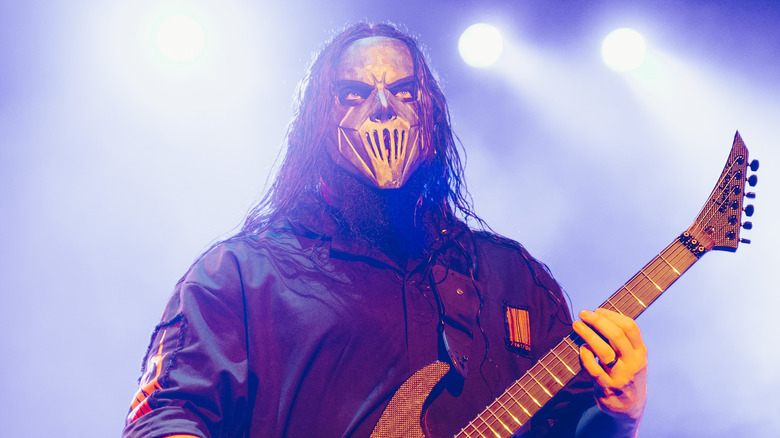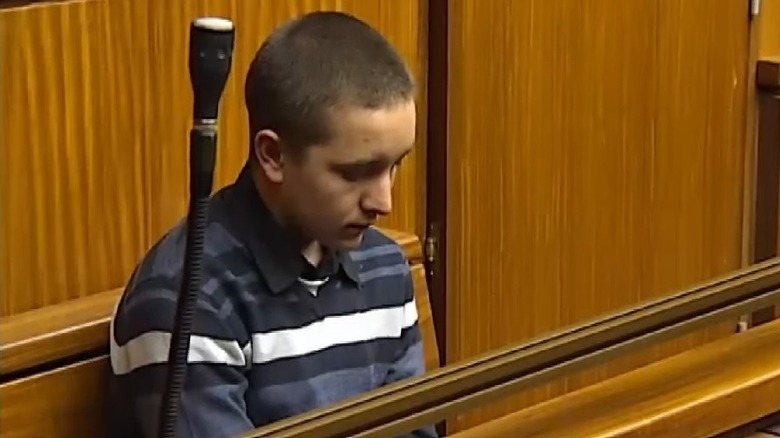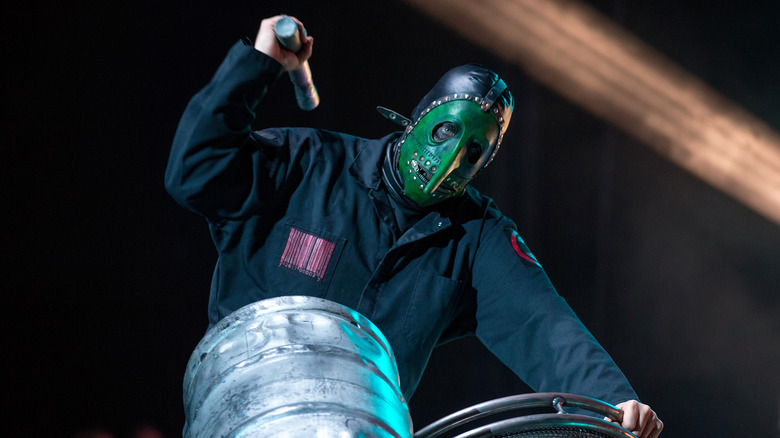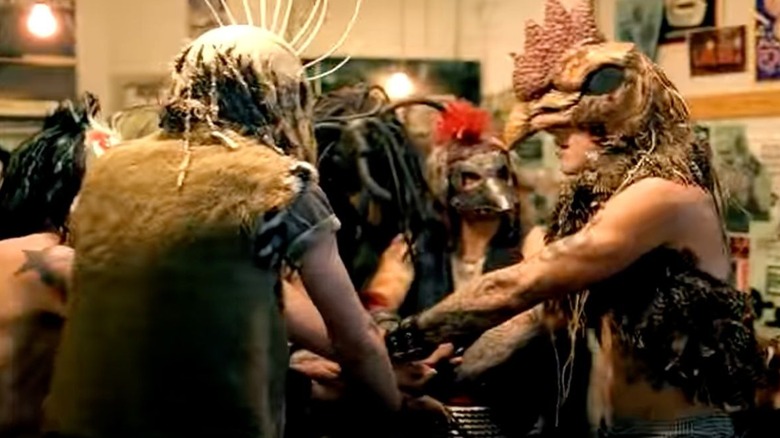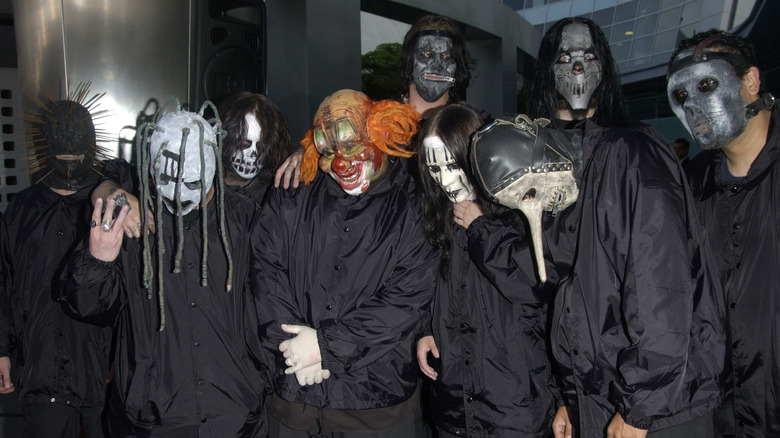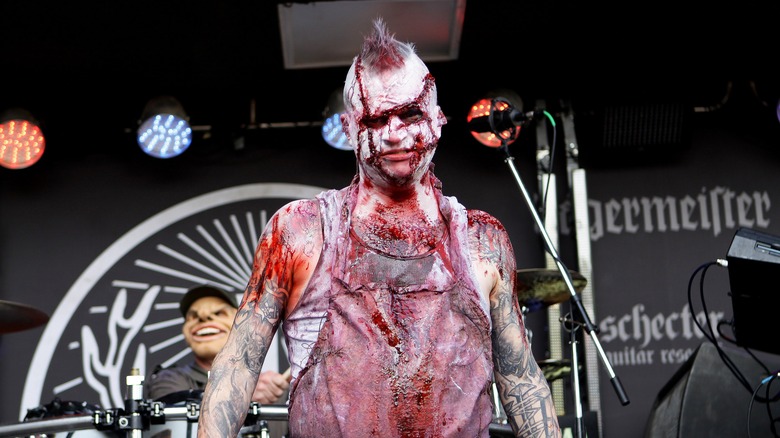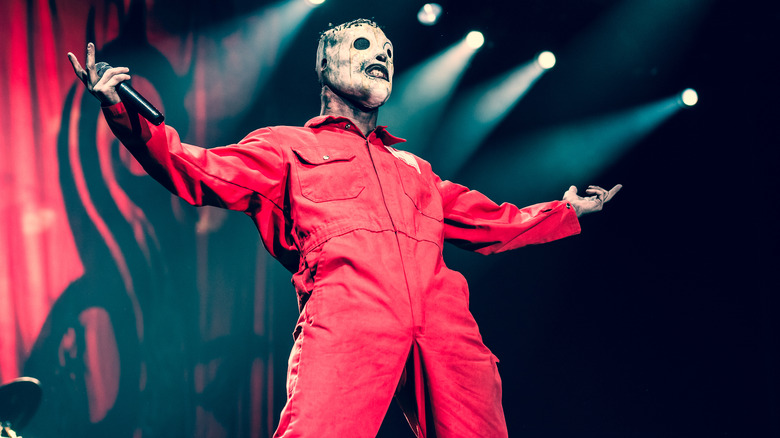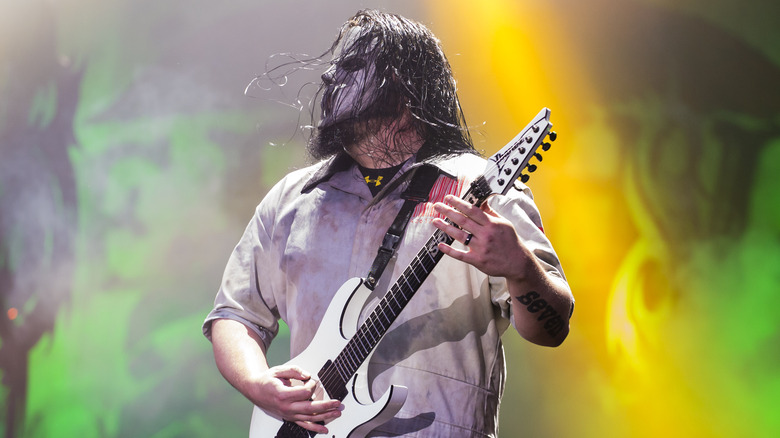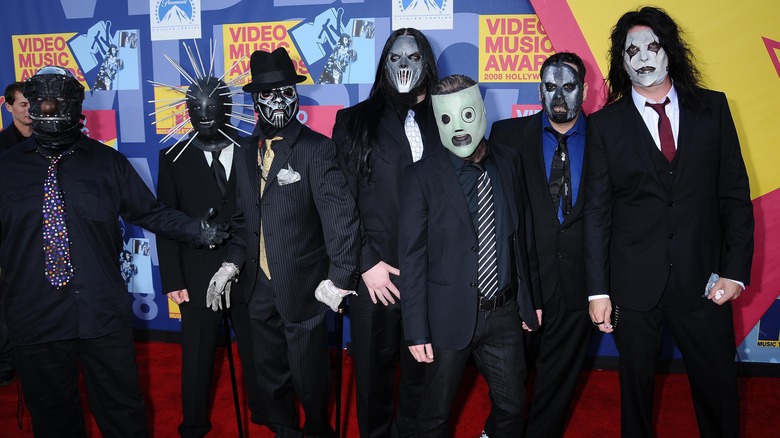The Biggest Controversies Surrounding Slipknot
Controversy sells, but who's buying? Millions, judging by Slipknot's success. As one of the most recognizable and talked-about heavy metal bands in the world, the Des Moines, Iowa, juggernaut has never shied away from the headlines. In fact, it's a recurring gag in the metal community to ask, "But what does Corey Taylor think of this?" whenever a news article is posted, since the band's vocalist is always one to air his opinions on various topics — no matter who gets offended or is in the line of fire, such as Machine Gun Kelly.
However, the group has also attracted serious scandals that have rocked the band members and even the world. A tetchy spotlight has been placed on Slipknot regarding topics such as white supremacy, satanism, and even a highly publicized school murder on another continent. While heavy metal is a musical genre that's often associated with danger, these events have forced the band to respond to allegations and tragedies, and even dispel rumors.
Any controversy can easily transform from free PR to public evisceration, and at times the band has been negatively affected by these incidents. With that said, let's take a look at the biggest controversies surrounding Slipknot.
Slipknot is blamed for a school murder
In 2008, Slipknot made headlines in the most unexpected of places: South Africa. It wasn't because the band announced a headlining tour of the country, but for something far more harrowing. As per The Guardian, 18-year-old Morne Harmse (pictured) — a student of Nic Diederichs Technical High School in Krugersdorp, a town about 20 miles west of Johannesburg — used a sword to attack and kill 16-year-old Jacques Pretorius on the school's premises. He also injured three other people in the process.
Reportedly, Harmse wore a mask reminiscent of the ones worn by Slipknot. There have been conflicting accounts of which band member's mask it was inspired by, with some reports saying Joey Jordison's and others listing Corey Taylor's. Nonetheless, it brought the band's name into the fray — and, according to Harmse's friends, he was also a fan of Slipknot and their music. The school murder sent shockwaves throughout the country and world, bringing up the debate surrounding violent music and whether Slipknot holds any accountability for what happened. In a later statement, Taylor expressed his concern about the event, but insisted Slipknot's message has never been negative or about harm. Instead, he urged their fans to be united rather than hurt each other.
For his crimes, Harmse was sentenced to 20 years in prison in 2009; however, he was released on parole in 2022.
A former member sued the band
Slipknot has always been a large enterprise, with nine members often taking to the stage for the chaos. It's quite the visual for the audience as this 18-leg metal mammoth headbangs for an entire set and puts on a seismic performance, but it has also resulted in several line-up changes. One of the more controversial departures involved the split between the band and percussionist Chris Fehn (pictured), who had been a part of the group from 1998 to 2019.
In 2019, Fehn filed a lawsuit against Slipknot and its management, claiming he had no knowledge of other band-related businesses. "He thought everyone was being treated equally," Fehn's attorney Joseph Dunne said to the Des Moines Register. "My client really is just hoping to figure out a way to work this out with the people he's worked side by side with for the last 20 years." Around the same time, the band posted a now-deleted message saying Fehn had been dismissed from the band, though Fehn's lawyer disputed the legality of it. However, the musician did leave the band.
Answering a fan's comment on Twitter, Corey Taylor proclaimed he was "wrongfully accused of stealing money." In 2020, Fehn's lawsuit against Slipknot was dismissed.
The group wanted to sue Burger King
It isn't unusual to hear about fast food franchises suing each other — it's almost par for the course, really. However, it isn't every day that news breaks of a heavy metal artist taking legal action against a burger joint, but that's what happened in 2005.
Burger King had created an advertising campaign for its new chicken fries. The commercials featured a fictional metal band called Coq Roq (pictured), who wore masks that made them look like chickens and rocked out in a big way.
As per The Smoking Gun, Slipknot's legal team sent out a notice to Burger King, claiming Coq Roq was directly influenced by the Iowa band — both in terms of their performance and the appearance of their masks. Burger King fought back, insisting there was no copyright infringement at all — and also pointing out that there are many other metal bands that wear masks, so it isn't exclusive to the 'Knot. In the end, the lawsuit went nowhere as both parties dropped the issue.
A Gawker article associated the band with white supremacy
As a public figure, it isn't always easy to control what people say about you. Slipknot has had to deal with a fair share of negative commentary and criticism throughout its tenure; however, there was a Gawker piece from 2016 that got everyone's backs up. In the article titled "This Shirtless Mountain Dew Motherf***er Is the Living Embodiment of Trump-Inspired White Supremacy," the author paints a picture of the stereotypical white supremacist, while seemingly suggesting they also listen to Slipknot.
Corey Taylor took to Twitter and said the author was way off the mark about the band. In an interview with Spin, Taylor discussed the issue and explained how the author told him he hadn't put the Slipknot reference in the piece in the first place. Nonetheless, it was amended by an editor thereafter with an apology to Slipknot for mentioning them.
Taylor added that there was no beef about the incident and he actually agreed with a lot of what the article said.
Jeffrey Hatrix accused the band of being a corporate clone
The feud between Mushroomhead and Slipknot is a tale as old as time. The two masked bands have beefed over who came first, and even the fans have gotten involved in the endless shenanigans and mudslinging — such as the time when Slipknot singer Corey Taylor accused Mushroomhead of egging on their hometown fans in Cleveland to chuck objects at the Iowa metallers, which ended up turning into a brawl between the group and the fans in attendance.
However, Mushroomhead's ex-singer Jeffrey Hatrix (pictured) took the feud to another level when he suggested Slipknot is nothing more than Roadrunner Records' corporate clone of his previous band on the "ADHD" podcast. Hatrix said that the record company had tried to sign Mushroomhead initially; however, the band declined since the cheddar on offer wasn't quite up to scratch and they didn't want to share their merchandising proceeds. The singer claimed that then-Roadrunner executive Monte Conner went to Slipknot, attempting to create the company's own version of Mushroomhead.
Hatrix added a friend of his told him that Taylor was well aware of this, but that he justified his decision to go through with it by saying he couldn't turn down all the money on offer.
The heavy metal group have been labeled satanists
With lyrics such as, "If you're 555, then I'm 666," (from the song "The Heretic Anthem" from 2001's "Iowa" album), it's unsurprising that Slipknot has courted controversy for being considered devil worshippers. In 2005, the Greek Orthodox Church even tried to prevent the band from playing in Athens, Greece, believing they needed to protect the citizens from artists who encourage satanism.
However, much like many metal artists before them, Slipknot dabbles in occult lyrics and controversial imagery as part of the music rather than as a way to honor the horned one. Speaking to Fox News in 2022, Corey Taylor discussed how it's still one of the biggest fallacies about the group.
"People to this day still think we're this satanic band, and we're demonic and all this weird crap," he said. "It's so easy for people to think that and then try to dismiss it. A lot of people still think this is all a gimmick. They don't understand that this is art and the music, for us, has always been number one." Taylor added that the band isn't relying on shock value, but they like to take the audience on a journey to explore the unknown and controversial topics.
A Slipknot guitarist was stabbed by his brother
Family disputes arise all the time. Sometimes, they can be about trivial matters, such as who ate the last bagel, and other times they're about more pertinent issues, like money. In the case of Slipknot guitarist Mick Thomson, an unknown argument between him and his brother Andrew turned particularly violent in 2015.
According to KCCI, the brothers got into a dispute at Mick's home in the early hours of the morning. The disagreement became physical as they made their way to the front yard and knives came into play. The police stated the two had stabbed each other, with Mick experiencing a head wound and both men showing signs of being inebriated.
The Thomson brothers were taken to a hospital, but they were both fine at the end of the day. Nonetheless, this was a controversial incident that raised the eyebrows of many Slipknot fans around the globe.
The group was banned after 9/11
September 11, 2001, was a day that changed the lives of millions. It brought America to a standstill and had a major impact on everything from politics to entertainment. Musicians such as Willa Ford have said the event influenced the trajectory of their careers, while Slipknot has also opened up about how it was a case of wrong place, wrong time for them.
Speaking to Revolver, the band's late bassist Paul Gray bemoaned how the release date of their record "Iowa" had shifted several times to finally land on August 28, while revealing how Slipknot was actually getting ready to head out on a big tour with System of a Down on the day when 9/11 struck. Percussionist Shawn Crahan explained how this cut short their touring plans and impacted any hype for the new record.
"We got banned at a lot of radio stations and MTV wouldn't touch us," Corey Taylor added. "So here we were with our finest work to date and nobody would give us the time of day. We were working our asses off and we weren't getting paid s***."
